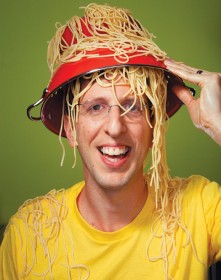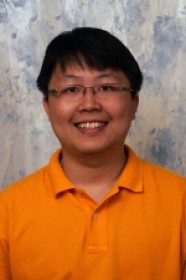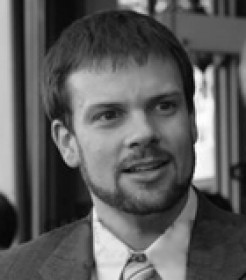Technology in Support of Graceful Aging
Event Location: NSH 1305Bio: Ron Baecker is Professor of Computer Science, Bell Chair in Human-Computer Interaction, co-founder of the Dynamic Graphics Project, founder of the Knowledge Media Design Institute, and founder and director of the Technologies for Aging Gracefully lab (TAGlab) at the University of Toronto. He is also Affiliate Scientist with theKunin-Lunenfeld Applied Research [...]
From Sorcery to Science: how Hollywood Physics impacts the Sciences
Event Location: NSH 1305Bio: Eitan Grinspun is Associate Professor of Computer Science at Columbia University in the City of New York. He was Professeur d'Université Invité at l'Université Pierre et Marie Curie in 2009, a Research Scientist at the Courant Institute of Mathematical Sciences from 2003-2004, and a graduate student at the California Institute of [...]
Search and Pursuit of Non-cooperative Targets with Unmanned Aerial Vehicles
Event Location: NSH 1109Abstract: Across many rescue, surveillance, and scientific applications, there exists a broad need to perform wide-area reconnaissance and terrain surveys, for which unmanned aerial vehicles (UAVs) are increasingly popular. This thesis considers the task of using one or more UAVs to locate an object of interest, provide continuous viewing, and rapidly re-acquire [...]
Representation, Planning, and Learning of Dynamic Ad Hoc Robot Teams
Event Location: GHC 8102Abstract: Task allocation involves the division of tasks among a team of robots, such that each robot is responsible for a subset of the tasks. Similarly, in role assignment, roles are typically defined to be performed by a single robot whose performance is independent of the composition of its team. Complex tasks, [...]
From Art and Perception to Visualization and Video Processing
Event Location: NSH 1305Bio: Michael Gleicher is a Professor in the Department of Computer Sciences at the University of Wisconsin, Madison. Prof. Gleicher is founder and leader of the Department's Computer Graphics group. His research interests include visualization, image and video processing tools, and character animation techniques for films and games. Prior to joining the [...]
Helping Each Other to See: Humans and Machines
Event Location: NSH 3305Bio: C. Lawrence Zitnick received the PhD degree in robotics from Carnegie Mellon University in 2003. His thesis focused on efficient inference algorithms for large-problem domains. Previously, his work centered on stereo vision, including the development of a commercial portable 3D camera. Currently, he is a researcher at the Interactive Visual Media [...]
Improving Robot Locomotion and Situational Awareness through Learning Methods for Expensive Black-Box Systems
Event Location: GHC 6501Abstract: The modular snake robots in Howie Choset’s lab provide an intriguing platform for research: they have already been shown to excel at a variety of locomotive tasks and have incredible potential for navigating complex terrains, but much of that potential remains untapped. Unfortunately, many techniques that are commonly used in robotics [...]
Segment-based SVMs for Time Series Analysis
Event Location: NSH 3305Abstract: Enabling computers to understand human and animal behavior has the potential to revolutionize many areas that benefit society such as clinical diagnosis, human-computer interaction, and social robotics. Critical to the understanding of human and animal behavior, and any temporally-varying phenomenon in general, is the capability to segment, classify, and cluster time [...]
Factor Graphs, Bayes Trees, and Preconditioning for SLAM and SFM
Event Location: NSH 1507Bio: Frank Dellaert is an Associate Professor in the School of Interactive Computing, College of Computing at Georgia Tech. His research is in the areas of Robotics and Computer vision. He is particularly interested in graphical model techniques to solve large-scale problems in mapping and 3D reconstruction. Abstract: Simultaneous Localization and Mapping [...]
Motion Planning for Physical Systems
Event Location: NSH 1305Bio: Lydia E. Kavraki is the Noah Harding Professor of Computer Science and Professor of Bioengineering at Rice University. Kavraki received her Ph.D. in Computer Science from Stanford University. Her research contributions are in the area of robotics (robot motion planning, hybrid systems, formal methods in robotics, assembly planning, micromanipulation, and flexible [...]









